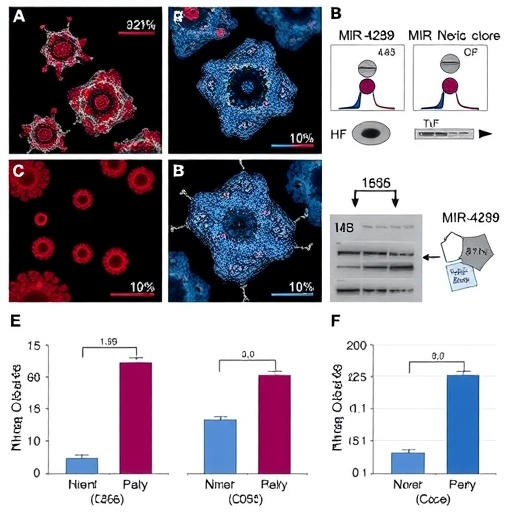In a groundbreaking study poised to transform the understanding of endometriosis and regenerative medicine, researchers have delved deep into the potential of exosome-encapsulated microRNA, specifically miR-4289, to influence the behavior of menstrual blood-derived mesenchymal stem cells (MB-MSCs) sourced from patients suffering from endometriosis. This pioneering research provides a glimpse into the innovative intersection of stem cell therapy and molecular biotechnology as solutions for persistent medical issues.
Endometriosis, a complex and often debilitating condition, affects millions of women worldwide, leading to chronic pain and infertility. It occurs when tissue similar to the lining inside the uterus, known as endometrial tissue, begins to grow outside the uterus. This aberrant growth can severely impact a woman’s quality of life and result in various reproductive health challenges. The prevalence and impact of this disease underscore an urgent need for effective therapeutic options.
Mesenchymal stem cells derived from menstrual blood are increasingly being recognized for their regenerative capabilities. These cells can differentiate into various cell types and possess inherent anti-inflammatory properties, making them a compelling prospect for treating diverse medical conditions, including endometriosis. However, the precise mechanisms that govern their function and interaction with other cellular entities remain an area of active exploration.
By encapsulating the microRNA miR-4289 within exosomes, the researchers aimed to enhance the therapeutic effects of these stem cells. Exosomes, small extracellular vesicles secreted by cells, play a crucial role in intercellular communication and can carry nucleic acids, proteins, and lipids. The utilization of exosomes for the targeted delivery of miRNAs represents a novel approach, tapping into their natural capacity to mediate physiological processes at the molecular level.
The focus on miR-4289 is particularly noteworthy, as this microRNA has been linked to various regulatory functions within cellular environments. Prior research has suggested that miR-4289 may influence inflammatory responses and cell signaling pathways, making it a prime candidate for studies related to endometriosis. Its encapsulation within exosomes not only protects the RNA from degradation but also enhances its uptake by target cells.
What sets this study apart is its methodological rigor. Researchers meticulously evaluated the efficacy of exosome-encapsulated miR-4289 on MB-MSCs extracted from endometriosis patients, adopting a multilayered analytical framework that combined in vitro experiments and advanced molecular assays. These rigorous experiments reveal how exosomal loading of miR-4289 can enhance the regenerative potential of stem cells, paving the way for innovative therapeutic strategies.
Moreover, the interplay between exosomes and stem cells opens avenues for revisiting traditional treatment paradigms for endometriosis. The reprogramming of MB-MSCs through the application of miR-4289 might not simply alleviate symptoms but could also address the underlying pathophysiology. Engaging stem cells in the repair process could catalyze a paradigm shift in how endometriosis is treated.
The implications of the research extend beyond the confines of endometriosis. By establishing protocols for using miRNA-laden exosomes, this work lays the foundation for broader applications in regenerative medicine. The versatility of exosomes offers potential therapeutic avenues not just for endometriosis, but also for various inflammatory and autoimmune diseases.
As promising as these findings are, challenges remain. The translation of laboratory findings into clinical applications necessitates extensive research and validation. Given the complexity of human physiology and variances in individual patient responses, future investigations will be critical to ascertain the safety and efficacy of these treatments in diverse populations.
The researchers emphasize that despite the intriguing possibilities presented by this study, it is paramount to conduct longitudinal studies that evaluate long-term impacts and monitor for any potential side effects. Understanding the therapeutic window and optimal dosing of miR-4289 will also be essential to maximize benefits while minimizing risks.
This exploratory study represents a significant leap towards new frontiers in treating endometriosis and enhancing the regenerative capacities of stem cells. For patients grappling with the debilitating consequences of endometriosis, the insight gained from such innovative approaches could rekindle hope for effective and lasting relief.
The community of researchers, clinicians, and patients should remain vigilant as more evidence emerges, potentially revolutionizing the management of endometriosis and broadening the horizons of regenerative medicine. By harnessing the power of molecular biochemistry through exosomes and microRNA, we may usher in a new era of personalized medicine that is both effective and sustainable.
In conclusion, the evaluation of exosome-encapsulated miR-4289 offers promises that transcend conventional therapeutic lines, highlighting an exciting intersection where molecular innovation meets patient care. The research conducted by Mahmoudi and colleagues illustrates the optimism that can emerge when rigorous science meets the urgent needs of patients, providing a clarion call for continued exploration and collaboration in the realm of regenerative therapies.
Subject of Research: Endometriosis and the effects of exosome-encapsulated microRNA on menstrual blood-derived mesenchymal stem cells.
Article Title: Evaluating the Effect of Exosome-Encapsulated miR-4289 on Menstrual Blood-Derived Mesenchymal Stem Cells from Endometriosis Patients.
Article References: Mahmoudi, S., Sheikholeslami, A., Roodbari, N.H. et al. Evaluating the Effect of Exosome-Encapsulated miR-4289 on Menstrual Blood-Derived Mesenchymal Stem Cells from Endometriosis Patients. Biochem Genet (2025). https://doi.org/10.1007/s10528-025-11265-2
Image Credits: AI Generated
DOI: https://doi.org/10.1007/s10528-025-11265-2
Keywords: Exosomes, microRNA, mesenchymal stem cells, endometriosis, regenerative medicine.




